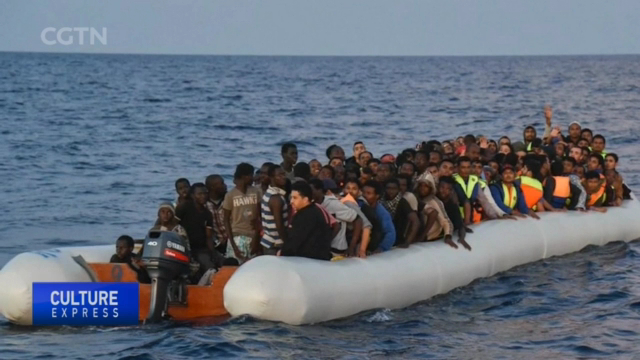
19:22, 06-Dec-2018
Global Migration Film Festival: Nigeria takes part in campaign against irregular immigration
Updated
18:13, 09-Dec-2018
03:22

The Global Migration Film Festival by the International Organization for Migration is underway in several countries across the world. The festival aims to enlighten people against irregular migration and its challenges through films. One of the festival venues is Lagos, where the I-O-M gathered a small group to discuss issues around irregular migration. CGTN's Deji Badmus reports.
The Global Migration Film Festival could not be coming at a better time for Nigeria. The country is struggling to put a check the number of its citizens making the treacherous journey to Europe through the desert and the sea. Many Nigerians have either died in the desert or at the Mediterranean Sea in their attempt to make it to Europe.
Almost every other week, hundreds of Nigerian migrants are repatriated from Libya. Nearly 11,000 have been repatriated this year alone. And it's estimated that thousands more are still trapped in the North African country while many at home are still embarking on the journey.
The film festival is designed to shed light on the scale and dangers of irregular migration as well as enlighten intending migrants to do it the right way. Two films, Granma and Bushfallers, both about two African migrants are screened before a select audience comprising returnee migrants, anti-trafficking officials and migration experts. The screening set the pace for a follow-up panel session to critic the films and discuss migration issues.
CHYLIAN AZU RETURNEE MIGRANT "This is more like to me, half of what actually happened because passing through the desert, passing through the Mediterranean Sea is horrible and people need to see it."
DANIEL ATOKOLO AGENCY FOR PROHIBITION OF PEOPLE TRAFFICKING "We have not told them that when they enter the desert, after a particular level, they have to pay for the urine of another person. If you have no cup, you have to stoop and drink it straight from somewhere. People think it's not happening but that is what happens in the desert."
Authorities in Nigeria in conjunction with the International Organisation for Migration have been carrying out series of campaigns to discourage irregular migration, some members of the panel here say more still needs to be done.
NIKKI LAOYE FOUNDER, ANGEL4LIFE FOUNDATION "Social media is very important and key at this point in time because even the average person has one tiny phone. The average person right now can buy data. We can actually make sure we put this information out and let people know that irregular migration is not the way to go."
CHYLIAN AZU RETURNEE MIGRANT "From my experience since I came back to Nigeria trying to sensitize people and talk to them about irregular migration, I discovered some of the horrible pictures is what actually scares them. When you show them the truth, they are scared to go there."
ALEX COLE NIGERIA PROGRAMME SUPPORT OFFICER, IOM "Along with showing the graphic nature of this journey, there has to be an alternative to that if we want to change people's behaviours because scaring someone when they feel like they have no other choice is not going to work. We have to provide these alternatives. We have to make it easier for people to get valid travel documents or visas or we need to make there are opportunities here at home."
Driven mainly by poverty, hundreds of Africans risk their lives almost every day attempting to make it to Europe through the desert and Mediterranean sea. Many have died in the process and much more remain trapped in Libya under horrid conditions. DB, CGTN, L, N.

SITEMAP
Copyright © 2018 CGTN. Beijing ICP prepared NO.16065310-3
Copyright © 2018 CGTN. Beijing ICP prepared NO.16065310-3